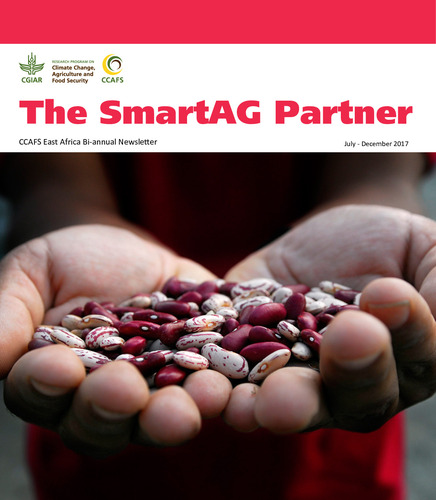The SmartAG partner: CCAFS East Africa Bi-annual Newsletter, July - December 2017
Abstract
We are pleased to share with you our SmartAg Partner bi-annual newsletter, highlighting policy engagement and ongoing research from July to December 2017.
In July, we hosted an online discussion forum on ‘Engaging African Youth in Agribusiness in a Changing Climate,’ a platform that created space to discuss critical issues facing African youth. The online discussion—which attracted 79 comments—ran for one month to commemorate World Youth Skills Day (15 July) and International Youth Day (12 August) and culminated in a webinar attended by 80 participants on 30 August. Climate services play a key role in supporting resilience of agricultural communities. In August, the Rwanda Climate Services for Agriculture project organized a four-day training of trainers on Participatory Integrated Climate Services for Agriculture (PICSA) in Huye district. This was followed by a field training, which allowed participants to work with smallholder farmers on the PICSA process.
Additionally, to empower decision-makers on climate services, IGAD Climate Prediction & Applications Centre (ICPAC) organized a workshop on ‘Existing and New Tools for Drought Monitoring and Forecasting in Eastern Africa’. CCAFS East Africa has begun to explore digital agriculture and its potential to transform farming in the region. In October, during the Global Green Growth Week, we brought together stakeholders to discuss the opportunities and challenges of digital agriculture.
As a result of the discussions held in Addis Ababa, Ethiopia, CCAFS East Africa is now leading the formation of a Public-Private Partnership project that is aimed at tackling the challenges related to agriculture data infrastructure.
In December, CCAFS scientists led a session on upscaling climate-smart agriculture through multi-stakeholder participation during the conference on “Research & Policy: two peas in a pod? A dialogue for food security impact” organized by the Netherlands Organisation for Scientific Research (NWO-WOTRO) and the Food and Business Knowledge Platform (F&BKP) in collaboration with the Dutch Ministries of Foreign Affairs and Agriculture, Nature and Food Quality. During the session, new projects on upscaling climate-smart agriculture approaches in Eastern and Southern Africa were presented that are expected to promote research-based advanced understanding of emerging key issues in global and regional food security, their impact on local food security, and the role of private sector development.

